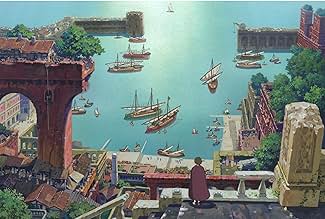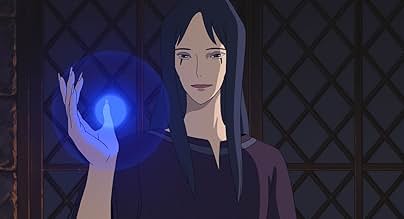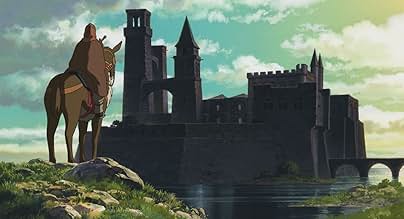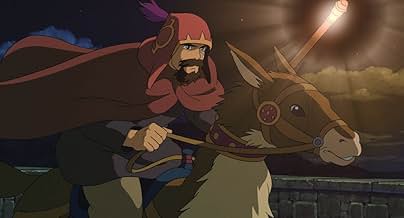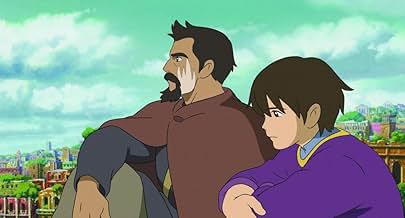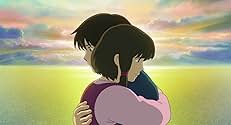AVALIAÇÃO DA IMDb
6,3/10
47 mil
SUA AVALIAÇÃO
Em uma terra mítica, um homem e uma criança investigam uma série de eventos incomuns.Em uma terra mítica, um homem e uma criança investigam uma série de eventos incomuns.Em uma terra mítica, um homem e uma criança investigam uma série de eventos incomuns.
- Direção
- Roteiristas
- Artistas
- Prêmios
- 3 indicações no total
Timothy Dalton
- Sparrowhawk
- (English version)
- (narração)
Willem Dafoe
- Cob
- (English version)
- (narração)
Mariska Hargitay
- Tenar
- (English version)
- (narração)
Jun'ichi Okada
- Arren
- (narração)
Aoi Teshima
- Theru
- (narração)
Bunta Sugawara
- Haitaka
- (narração)
Yûko Tanaka
- Cob
- (narração)
Teruyuki Kagawa
- Hare
- (narração)
Jun Fubuki
- Tenar
- (narração)
Takashi Naitô
- Hazia Dealer
- (narração)
Mitsuko Baishô
- The Mistress
- (narração)
Yui Natsukawa
- The Queen
- (narração)
Kaoru Kobayashi
- The King
- (narração)
Matt Levin
- Arren
- (English version)
- (narração)
Cheech Marin
- Hare
- (English version)
- (narração)
Blaire Restaneo
- Therru
- (English version)
- (narração)
Jeff Bennett
- Additional Voices
- (English version)
- (narração)
Susanne Blakeslee
- The Queen
- (English version)
- (narração)
- (as Suzanne Blakeslee)
Avaliações em destaque
After watching this film I was pleased with the overall feel and look the production. Most notably I was impressed with the studio's visual creation of Earthsea. While the artistry and animation quality does not entirely measure up to other recent Ghibli studio films, I felt it did create a rich and colorful setting in which the story unfolds. A solid score also helps to shape the vibrant world that the movie conveys. However, I wouldn't consider all this to be a faithful representation of Ursula k. Le Guin's literary Earthsea, but rather something unique on to itself. One thing in particular that I think separates the film setting from that of the books' is the absence of the sea. I'm not saying its not there, just that it seems to mostly be in the background.
As for the story I don't think it stands out as anything great. It was limited from the start. The movie like the book is a single episode in a much larger tale. In no way could it possibly encompass the magnitude of the Earthsea series, let alone the main events in The Farthest Shore. It would simply be too much to present in a canvass of its length. As a result It lacks the epic feel of Princess Mononoke or the closure that comes at the end of Spirited Away. In other respects though, the film borrows heavily from Ghibli's previous works, mainly with the characters. They are shadows of former Ghibli creations, but due to their interaction and set of circumstances they retain some originality. I might also add that they come off as serious, and are far removed from the playful personalities that give other Ghibli films their charm. This said they still manage to play out their given roles and drive the story forward. From beginning to end the film holds up in large part because the setting never loses its feel.
I enjoyed this picture in spite of its flaws, again because of it's look and feel. For once I could see winged dragons clash and wizards face off in a Ghibli film. In my opinion Goro Miyazaki did a decent job bringing it all to life. At the same time, I hope he will learn from this experience and strive to do better next time. After my seeing Gedo Senki he has my support.
As for the story I don't think it stands out as anything great. It was limited from the start. The movie like the book is a single episode in a much larger tale. In no way could it possibly encompass the magnitude of the Earthsea series, let alone the main events in The Farthest Shore. It would simply be too much to present in a canvass of its length. As a result It lacks the epic feel of Princess Mononoke or the closure that comes at the end of Spirited Away. In other respects though, the film borrows heavily from Ghibli's previous works, mainly with the characters. They are shadows of former Ghibli creations, but due to their interaction and set of circumstances they retain some originality. I might also add that they come off as serious, and are far removed from the playful personalities that give other Ghibli films their charm. This said they still manage to play out their given roles and drive the story forward. From beginning to end the film holds up in large part because the setting never loses its feel.
I enjoyed this picture in spite of its flaws, again because of it's look and feel. For once I could see winged dragons clash and wizards face off in a Ghibli film. In my opinion Goro Miyazaki did a decent job bringing it all to life. At the same time, I hope he will learn from this experience and strive to do better next time. After my seeing Gedo Senki he has my support.
Films experiencing production hell are rarely as good as they might have been, no matter how good the director is (c.f. Gangs of New York and AI) and this one is no exception.
Taken on its own terms, Tales of Earthsea is a competent, if not breathtaking, start for Miyazaki junior, and bears comparison to the lesser Gibli canon without scaling the heights of its major work. It is unfair to compare it to My Cousin Totoro, Spirited Away or Graveyard of the Fireflies; but it is also a shame for the fans of Earthsea. They didn't get a top director at the top of his game.
The principal problem with the film is that it doesn't seem to know what to do with the books it is based on. Are they source material to be pillaged? Are they stories to be adapted? Are they concepts to be explored? In the end Miyazaki opts for a mix: the narrative structure is broadly based on the third novel (The Farthest Shore), with a significant sub-plots from both the first (The Wizard of Earthsea) and the fourth (Tehanu). Into the mix he throws some recognisable manga/anime formulae (the arch-enemy; the ronin henchmen; the violence) which cut across the major themes explored by the novels and alluded to by the film.
If this all sounds like a disaster, it isn't exactly. The plot functions: evil wizard, through pride, upsets the balance of Earthsea forcing archmage, Sparrowhawk, in the company of a young prince, to do battle to restore the balance, destroy the evil and face down their own demons. Had Miyazaki been more ruthless all would probably have been well for anime fans anyway. But there are too many blind alleys, lose ends and needless distractions all nods to the books - which make the first half of the film in particular feel like a second rate brass band meandering painfully around a Brassed Off version of Adagio for Strings. The narcotic Hazia, for example, which dominates the beginning of the third story, is introduced early in the film and then simply abandoned. Later, Tenar's back-story fades into nothingness leaving the audience with a forcible impression of a producer impatiently looking at his watch. The whole effect is not homage, but distraction and a film that it is at least 40minutes longer than it needed to be.
Ursula LeGuin, who wrote the Earthsea novels, had suggested to (Hayao) Miyazaki that he create new story for Ged, uncluttered by her previous stories, set in the many years between the first two books. This would have made for a less ponderous film.
Regarding the technical side of animation; it appears the younger Miyazaki was aiming for the dreamlike quality of animation so characteristic of his father's work. Again, he has some partial success in this regard, although it is undeniably more clunky than other Gibli titles. But a lot can be forgiven for his reliance on hand-drawn animation, and there are some moments of real beauty windblown grasses, rocks on the seashore and chill sunsets. This, along with some strong characters and a much tighter second half, make Tales from Earthsea watchable film, if a slightly underwhelming one. But better than Disney. 6/10
Taken on its own terms, Tales of Earthsea is a competent, if not breathtaking, start for Miyazaki junior, and bears comparison to the lesser Gibli canon without scaling the heights of its major work. It is unfair to compare it to My Cousin Totoro, Spirited Away or Graveyard of the Fireflies; but it is also a shame for the fans of Earthsea. They didn't get a top director at the top of his game.
The principal problem with the film is that it doesn't seem to know what to do with the books it is based on. Are they source material to be pillaged? Are they stories to be adapted? Are they concepts to be explored? In the end Miyazaki opts for a mix: the narrative structure is broadly based on the third novel (The Farthest Shore), with a significant sub-plots from both the first (The Wizard of Earthsea) and the fourth (Tehanu). Into the mix he throws some recognisable manga/anime formulae (the arch-enemy; the ronin henchmen; the violence) which cut across the major themes explored by the novels and alluded to by the film.
If this all sounds like a disaster, it isn't exactly. The plot functions: evil wizard, through pride, upsets the balance of Earthsea forcing archmage, Sparrowhawk, in the company of a young prince, to do battle to restore the balance, destroy the evil and face down their own demons. Had Miyazaki been more ruthless all would probably have been well for anime fans anyway. But there are too many blind alleys, lose ends and needless distractions all nods to the books - which make the first half of the film in particular feel like a second rate brass band meandering painfully around a Brassed Off version of Adagio for Strings. The narcotic Hazia, for example, which dominates the beginning of the third story, is introduced early in the film and then simply abandoned. Later, Tenar's back-story fades into nothingness leaving the audience with a forcible impression of a producer impatiently looking at his watch. The whole effect is not homage, but distraction and a film that it is at least 40minutes longer than it needed to be.
Ursula LeGuin, who wrote the Earthsea novels, had suggested to (Hayao) Miyazaki that he create new story for Ged, uncluttered by her previous stories, set in the many years between the first two books. This would have made for a less ponderous film.
Regarding the technical side of animation; it appears the younger Miyazaki was aiming for the dreamlike quality of animation so characteristic of his father's work. Again, he has some partial success in this regard, although it is undeniably more clunky than other Gibli titles. But a lot can be forgiven for his reliance on hand-drawn animation, and there are some moments of real beauty windblown grasses, rocks on the seashore and chill sunsets. This, along with some strong characters and a much tighter second half, make Tales from Earthsea watchable film, if a slightly underwhelming one. But better than Disney. 6/10
I've just come back from seeing this movie in the cinema. Being a devoted Studio Ghibli fan, going to see one of their movies on the big screen was an exciting event for which I had high expectations (I avoided reading any reviews). I am sorry to say that these were not met.
Having never read any of the books this film is based on, a lot of it didn't make any sense. Most of the concepts and character motivations are not given adequate exposition and a lot of things that you think will be resolved and explained as the movie goes on are never expanded upon (or indeed, resolved). Without giving anything away, the main character commits an outrageous action (especially for Ghibli heroes) at the start of the film, but the motivation for said action is not adequately expanded upon and he never really redeems himself (which makes it very difficult to engage with him for the rest of the film). It nearly felt like I was being punished for not being familiar with the source material.
The middle section is very slow moving, in fact nearly all of the action is to be seen at the beginning and towards the finale. Coupled with the lack of exposition on what's actually going on, it seemed like the film was just treading water, waiting for something interesting to happen (and in a 130 minute film, that's a bad thing!).
The ending, while being emotionally rousing and a spectacular set-piece, doesn't really make a lot of sense, as nearly all of the film focuses on a different protagonist than the one that eventually ends up saving the day.
Technically this film is not a patch on Spirited away, Howl's moving castle or Princess Mononoke, in fact the animation is more reminiscent of earlier Studio Ghibli films, such as Nausicaa (however these had wonderful stories to make them instant classics). The only thing that distinguishes it are the lighting effects, which are often superlative.
The music is great and very atmospheric.
Overall I'd have to say that it's worth watching when it comes out on TV, but not good enough to warrant making a trip to one of few cinemas showing it in the UK, or buying it full price on DVD, and this is something that I never thought I'd hear myself say as a die-hard (and now very disappointed) Studio Ghibli fan.
One final thing, this film has no sense of humour. The movie takes itself overwhelmingly serious with none of the "larger than life" magic that people have come to associate with Studio Ghibli.
Having never read any of the books this film is based on, a lot of it didn't make any sense. Most of the concepts and character motivations are not given adequate exposition and a lot of things that you think will be resolved and explained as the movie goes on are never expanded upon (or indeed, resolved). Without giving anything away, the main character commits an outrageous action (especially for Ghibli heroes) at the start of the film, but the motivation for said action is not adequately expanded upon and he never really redeems himself (which makes it very difficult to engage with him for the rest of the film). It nearly felt like I was being punished for not being familiar with the source material.
The middle section is very slow moving, in fact nearly all of the action is to be seen at the beginning and towards the finale. Coupled with the lack of exposition on what's actually going on, it seemed like the film was just treading water, waiting for something interesting to happen (and in a 130 minute film, that's a bad thing!).
The ending, while being emotionally rousing and a spectacular set-piece, doesn't really make a lot of sense, as nearly all of the film focuses on a different protagonist than the one that eventually ends up saving the day.
Technically this film is not a patch on Spirited away, Howl's moving castle or Princess Mononoke, in fact the animation is more reminiscent of earlier Studio Ghibli films, such as Nausicaa (however these had wonderful stories to make them instant classics). The only thing that distinguishes it are the lighting effects, which are often superlative.
The music is great and very atmospheric.
Overall I'd have to say that it's worth watching when it comes out on TV, but not good enough to warrant making a trip to one of few cinemas showing it in the UK, or buying it full price on DVD, and this is something that I never thought I'd hear myself say as a die-hard (and now very disappointed) Studio Ghibli fan.
One final thing, this film has no sense of humour. The movie takes itself overwhelmingly serious with none of the "larger than life" magic that people have come to associate with Studio Ghibli.
Eh, let's just call Tales from Earthsea a case of growing pains for Goro Miyazaki.
It's not a bad movie. It's just unremarkable in every way. It doesn't have the creativity, emotional depth, or beauty of Spirited Away, the visual wonder of Howl's Moving Castle, the scope of adventure of Castle in the Sky, the lovable characters of Kiki's Delivery Service, or the sheer delight and fun of Ponyo.
If I had to choose a defining feature for Earthsea, I honestly don't know what it would be. The music is fine, but nothing extraordinary. The character designs and artwork are dangerously close to generic, the story lacks tension and feels almost inconsequential, and the writing is bland. Where's the heart? Where's the humor, the passion, or something that would draw me into the narrative?
I found myself not caring much about what was happening, and more concerned with how much time was left until the movie was over, than anything else. My expectations for Studio Ghibli are far too high to embrace a movie like this that barely scrapes above mediocrity, and from what I've heard from fans of the Earthsea literature, this isn't the adaptation they were hoping for, either.
It's not a bad movie. It's just unremarkable in every way. It doesn't have the creativity, emotional depth, or beauty of Spirited Away, the visual wonder of Howl's Moving Castle, the scope of adventure of Castle in the Sky, the lovable characters of Kiki's Delivery Service, or the sheer delight and fun of Ponyo.
If I had to choose a defining feature for Earthsea, I honestly don't know what it would be. The music is fine, but nothing extraordinary. The character designs and artwork are dangerously close to generic, the story lacks tension and feels almost inconsequential, and the writing is bland. Where's the heart? Where's the humor, the passion, or something that would draw me into the narrative?
I found myself not caring much about what was happening, and more concerned with how much time was left until the movie was over, than anything else. My expectations for Studio Ghibli are far too high to embrace a movie like this that barely scrapes above mediocrity, and from what I've heard from fans of the Earthsea literature, this isn't the adaptation they were hoping for, either.
Watching Tales from Earthsea, I felt like I had been dropped off in the middle of a book series with no real context as to what was going on. I enjoyed the beautiful animation and ended up finding interest in the story and characters, but at the end of the film I still felt like I was missing something. Studio Ghibli probably should have set this one up better.
Você sabia?
- CuriosidadesHayao Miyazaki first wrote to author Ursula K. Le Guin about adapting her book into a film. LeGuin at the time was unfamiliar with Miyazaki's work, and associated animation to be similar to Disney animation, and turned the offer down. After she saw Meu Amigo Totoro (1988), she loved it, and decided to allow the movie to be made.
- Citações
Haitaka: Now listen to me, Aaren: No man nor any living thing in this world preserves their life forever. But only to men is it given to know that we must die, and that is a precious gift. This life that is both our torment and our treasure was never meant to endure for eternity. Life is a wave on the sea. Would you force the sea to grow still to save one wave? To save yourself?
- ConexõesFeatured in Nova York, Eu Te Amo (2008)
- Trilhas sonorasSong of Time
Lyrics by Akino Arai and Gorô Miyazaki and music by Akino Arai and Hisaaki Hogari
Performed by Aoi Teshima
Principais escolhas
Faça login para avaliar e ver a lista de recomendações personalizadas
- How long is Tales from Earthsea?Fornecido pela Alexa
Detalhes
- Data de lançamento
- País de origem
- Central de atendimento oficial
- Idioma
- Também conhecido como
- Cuentos de Terramar
- Empresas de produção
- Consulte mais créditos da empresa na IMDbPro
Bilheteria
- Faturamento bruto nos EUA e Canadá
- US$ 48.658
- Fim de semana de estreia nos EUA e Canadá
- US$ 20.614
- 15 de ago. de 2010
- Faturamento bruto mundial
- US$ 68.673.762
- Tempo de duração1 hora 55 minutos
- Cor
- Mixagem de som
- Proporção
- 1.85 : 1
Contribua para esta página
Sugerir uma alteração ou adicionar conteúdo ausente

Principal brecha
By what name was Contos de Terramar (2006) officially released in India in Hindi?
Responda



